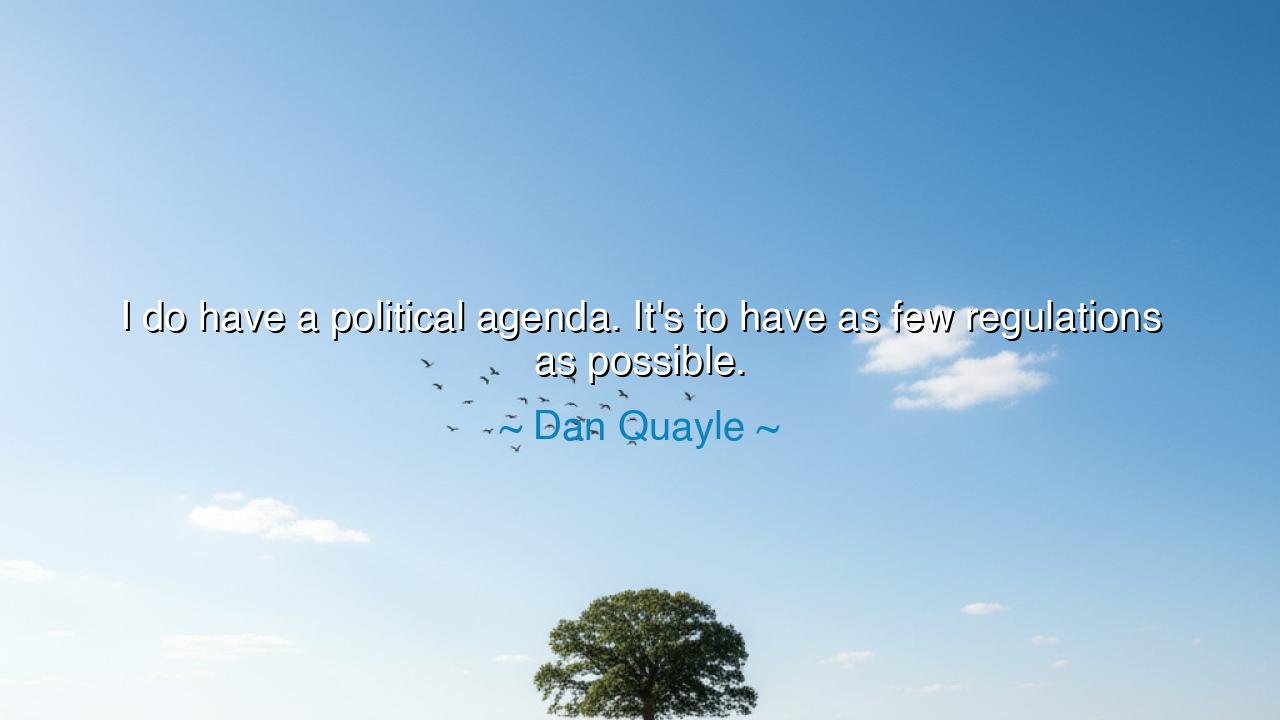
I do have a political agenda. It's to have as few regulations as






The words of Dan Quayle, “I do have a political agenda. It’s to have as few regulations as possible,” reflect a creed that stretches back through the ages: the yearning of humankind to be free from the binding cords of excessive rule. His statement arises from the belief that too many laws suffocate the spirit of enterprise, innovation, and independence. For while some regulations safeguard justice, too many can become chains upon the hands of the people.
In the ancient days, wise rulers understood that the measure of a kingdom was not in the abundance of decrees, but in the trust between the sovereign and the governed. When laws multiplied beyond reason, confusion spread, and freedom withered. The people, overwhelmed by edicts, ceased to thrive, for their every action was bound in fear of punishment. Thus Quayle’s words carry the echo of a timeless warning: liberty dies not only under tyrants, but also under the weight of too many rules.
Consider the example of the early American pioneers, who journeyed westward into untamed lands. They were guided less by official laws and more by a spirit of self-reliance and mutual trust. With few regulations, they built communities, schools, and trade by the strength of their will and the bonds of neighborly faith. Their flourishing reminds us that sometimes simplicity in governance allows greatness in the people.
Yet, the ancients also remind us: not all regulation is oppression. Just as a shepherd’s staff guides the flock away from cliffs, so do wise laws protect the vulnerable and preserve justice. The balance lies in restraint. Too few rules invite chaos, too many smother freedom. The true statesman seeks not to multiply commands, but to craft only those that shield without suffocating.
Thus, let the lesson endure: the pursuit of liberty requires vigilance. Power ever tempts rulers to weave endless nets of control, but the wise know that the highest agenda is to empower the people, not ensnare them. When laws serve life rather than bind it, nations rise. When regulation becomes excess, the human spirit falters. In this balance lies the path to prosperity, dignity, and lasting freedom.






KNBui khanh ngoc
It’s easy to argue that fewer regulations mean less government interference, but what are the unintended consequences of that? Isn’t the point of regulations to prevent harm and create a fair playing field for everyone? Does Dan Quayle’s ideal really take into account the complexity of modern issues like climate change, data privacy, and worker rights? How might such a policy affect different sectors of society?
UGUser Google
I find this quote interesting, as it brings up the ongoing debate about the role of government in regulating industries. On one hand, less regulation can foster innovation and economic growth, but on the other hand, it might lead to less accountability. Should we prioritize deregulation at the cost of potential social or environmental harm? Could certain industries really thrive in an unregulated environment without harming the public interest?
TNQuynh Nguyen Thi Nhu
Dan Quayle’s stance on having fewer regulations definitely raises a lot of questions about governance and the role of the state. How can we ensure fairness in business, protect vulnerable groups, and avoid environmental damage with minimal regulation? Is the goal really to reduce government interference, or should the focus be on making sure regulations are smarter and more effective instead of just fewer?
BYBao Yen
I get the appeal of less government intervention, but I wonder if Dan Quayle is overlooking the complexities of regulation. Without laws and regulations, who is going to ensure fairness, prevent exploitation, and safeguard public interest? Can we really expect businesses and individuals to act responsibly without any oversight, or does human nature necessitate some form of regulation to maintain balance and order?
BC0.1 Bao Chau
This quote seems to suggest that fewer regulations are always better, but isn’t that oversimplifying things? While overregulation can stifle innovation and growth, aren’t some regulations essential for protecting workers, the environment, and consumers? Where do we draw the line? Is it realistic to expect that reducing regulations across the board would always lead to positive outcomes for everyone?